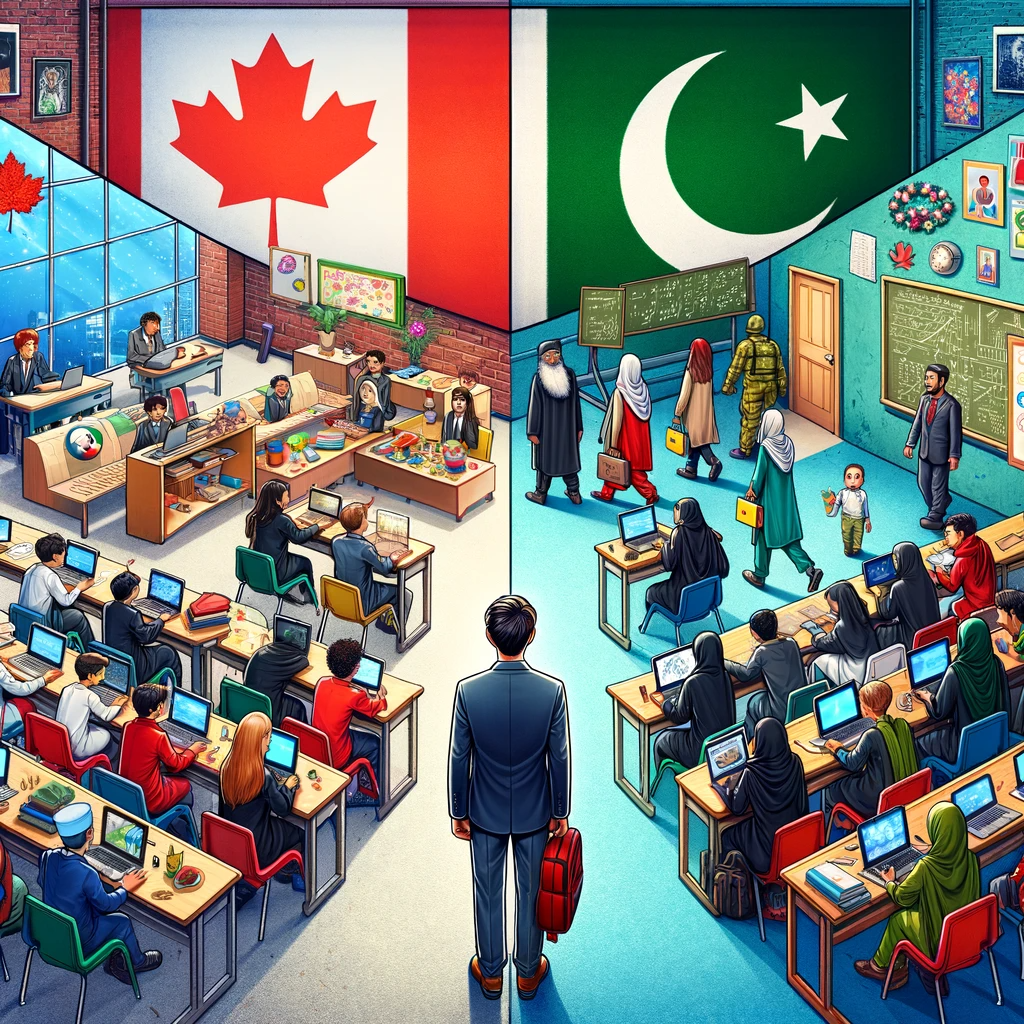How Does the Canadian Education System Differ for Pakistani Students?
Embarking on an educational journey from Pakistan to Canada is more than just a change of geography; it’s a leap into a diverse, inclusive, and dynamic learning environment that can shape students’ futures in profound ways. Pakistani students, accustomed to a certain educational structure and cultural ethos, may find the Canadian education system to be a blend of opportunities, challenges, and novel experiences. This blog post delves into the nuances of this transition, highlighting the differences and what Pakistani students can expect in the Canadian educational landscape.

Educational Structure: A Foundation of Differences
The Canadian education system, known for its high standards and global recognition, differs markedly from Pakistan’s. In Canada, education is divided into primary, secondary, and post-secondary levels, but what sets it apart is the flexibility and variety within these levels. Unlike the more uniform approach in Pakistan, Canadian provinces have the autonomy to design their curricula, leading to slight variations in educational practices across the country. This decentralized approach ensures that education is tailored to regional needs while maintaining national standards.
Curriculum and Pedagogy: Embracing a Holistic Approach
Canadian education emphasizes a holistic development model, focusing not only on academic excellence but also on physical, emotional, and social growth. This contrasts with the often exam-centric approach in Pakistan, where academic performance is heavily weighted. In Canadian classrooms, there is a strong emphasis on developing critical thinking, creativity, and problem-solving skills. The pedagogy is student-centered, promoting active learning, participation, and collaboration, which may be a shift for Pakistani students used to more traditional, teacher-led classrooms.
Language: The Medium that Bridges Worlds
Language is another significant difference. In Canada, the primary languages of instruction are English and French, depending on the province. Pakistani students from English-medium schools might adapt more quickly, but those from Urdu-medium institutions may face initial language barriers. However, Canadian educational institutions provide ample language support, including ESL (English as a Second Language) programs, to help non-native speakers bridge this gap.
Cultural Diversity: A Mosaic of Global Perspectives
Canada’s multicultural ethos is mirrored in its educational institutions, where diversity is not just accepted but celebrated. Pakistani students will find themselves amidst a mosaic of cultures, offering a rich tapestry of perspectives that enhance the learning experience. This environment fosters cultural exchange and understanding, preparing students for a globalized world. Adapting to this diverse setting, however, requires an open mind and flexibility, as students navigate new social norms and practices.
Grading and Assessment: Beyond Just Exams
The Canadian grading system might come as a surprise to Pakistani students. Continuous assessment, including class participation, group projects, and regular assignments, plays a significant role alongside traditional exams. This approach encourages consistent effort and provides a more comprehensive evaluation of a student’s abilities and understanding. Feedback is constructive and interactive, aimed at fostering growth and improvement, a departure from the more result-oriented feedback in Pakistan.
Legal and Policy Framework: Navigating New Waters
International students in Canada enjoy certain rights, such as the ability to work part-time during their studies, which can be an essential aspect of the educational experience. However, they also have responsibilities and must navigate a new legal and policy framework, including adherence to study permit conditions and understanding Canadian laws and cultural norms. Canadian institutions offer robust support systems to help international students acclimate, including orientation programs, legal advice, and mental health services.
Cost of Education: An Investment in the Future
Education in Canada represents a significant financial investment, especially for international students. Tuition fees and living expenses can be substantially higher than in Pakistan. However, the return on this investment can be substantial, given the quality of education, the global recognition of Canadian degrees, and the opportunities for personal and professional growth. Moreover, scholarships, bursaries, and work-study programs can help mitigate these costs.
Opportunities Post-Graduation: A Pathway to the Future
One of the most attractive aspects of Canadian education for Pakistani students is the post-graduation opportunities. Canada offers various work and immigration options for graduates, including the Post-Graduation Work Permit Program (PGWPP), which allows students to gain valuable Canadian work experience. This is a stark contrast to the more limited opportunities available in Pakistan and can be a pathway to permanent residency and citizenship in Canada.
Adjusting to a New Academic Culture
Adjusting to the Canadian education system requires patience, resilience, and an open mind. Pakistani students may face challenges such as homesickness, cultural shock, and academic adjustments. However, the inclusive and supportive Canadian educational environment, combined with the diverse student body, provides a rich ground for personal growth and learning.
Embracing the Opportunities
For Pakistani students, studying in Canada is not just about acquiring a degree; it’s about embracing a journey of personal and intellectual growth. The differences in the education system, while challenging, offer a unique opportunity to develop a global perspective, critical thinking skills, and a deep appreciation for cultural diversity.
Conclusion
Transitioning from the Pakistani education system to the Canadian one is a transformative experience that extends beyond the classroom. It’s an opportunity to engage with the world in new ways, to challenge oneself, and to build a foundation for a promising future. For Pakistani students, this journey is not without its challenges, but the rewards, both personal and professional, are immeasurable. As they navigate this new educational landscape, they not only gain academic knowledge but also life skills that prepare them for the global stage.



